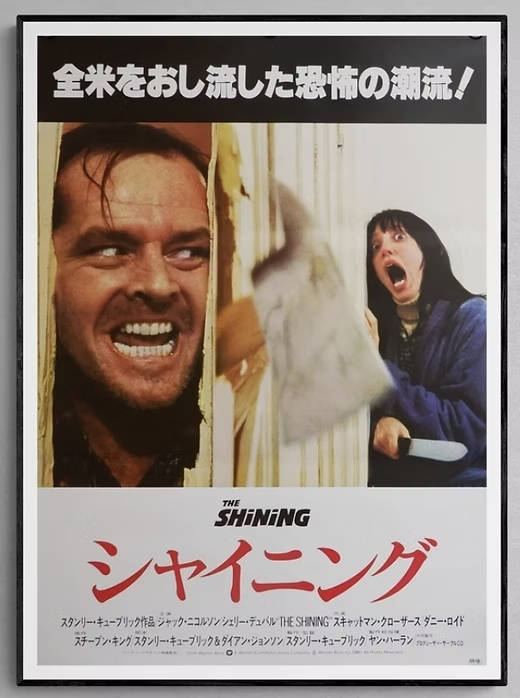The Shining: An Odyssey of Madness
Stanley Kubrick’s cold and frightening “The Shining” challenges us to decide: Who is the reliable observer? Whose idea of events can we trust? In the opening scene at a job interview, the characters seem reliable enough, although the dialogue has a formality that echoes the small talk on the space station in “2001.” We meet Jack Torrance (Jack Nicholson), a man who plans to live for the winter in solitude and isolation with his wife and son. He will be the caretaker of the snowbound Overlook Hotel. His employer warns that a former caretaker murdered his wife and two daughters, and committed suicide, but Jack reassures him: “You can rest assured, Mr. Ullman, that’s not gonna happen with me. And as far as my wife is concerned, I’m sure she’ll be absolutely fascinated when I tell her about it. She’s a confirmed ghost story and horror film addict.”
Once Jack and his family enter the Overlook, the movie frequently emphasizes how big and wide the hotel looks inside—especially when they are the only people inside the hotel after its closing day. As the camera steadily follows its main characters moving around here and there in the hotel, their surrounding environment often feels as vast as the space background of “2001: A Space Odyssey.” There seems to be no possible way out for them at times, as reflected when the camera ominously looks down upon Wendy and Danny wandering inside a big hedge maze right next to the hotel building.
Around that point, Jack is already tumbling toward madness, so we depend more on Danny and Wendy’s perspective. Still, neither is very reliable because they become psychologically isolated in their own way too. After experiencing something scary in a certain room in the hotel, Danny’s mind is much more unsettled than before, and those horrific visions of his soon come quite true to his petrified horror. In the case of Wendy, she desperately tries to get things under her meager control, but there inevitably comes a point where she finds herself swept into her terror and confusion.

Kubrick keeps everything cold and distant, just like he did in many of his films, which makes the movie all the more terrifying. While its three main characters are broad caricatures, their descent into insanity is still quite arresting because of the overwhelming claustrophobia. Seemingly trapped forever in their separated status, they lose more human qualities alone, which was probably why Kubrick deliberately had his two lead performers go over the top in their forthright acting. While Nicholson dials up his familiar manic mode as much as demanded, Shelley Duvall amplifies her neurotic quality to the extreme. Her strenuous efforts here in this film deserve more appreciation, especially considering how Kubrick harshly treated her during the shooting.
“The Shining” is based on the novel of the same name by Stephen King, who disliked the movie for understandable reasons. To King’s dismay, Kubrick erased most of the human depth in the original story while adapting with co-writer Diane Johnson. Instead, he distilled the claustrophobic qualities of King’s story for his single-minded artistic vision, and his achievement has considerably influenced a bunch of arthouse horror films, such as Ari Aster’s debut feature “Hereditary” (2017), which owes a lot to “The Shining.”

THE SHINING (1980) Breakdown | Ending Explained, Easter Eggs, Creepy Hidden Details & Film Analysis
Stanley Kubrick
Eyes Wide Shut (1999)
Stanley Kubrick’s “Eyes Wide Shut” is like an erotic daydream about chances missed and opportunities avoided. For its hero, who spends two nights wandering in the sexual underworld, it’s all foreplay. He never actually has sex, but he dances close, and holds his hand in the flame. Why does he do this? The easy answer is that his wife has made him jealous. Another possibility is that the story she tells inflames his rather torpid imagination.
https://www.rogerebert.com/reviews/eyes-wide-shut-1999





.jpeg)
















.jpg)